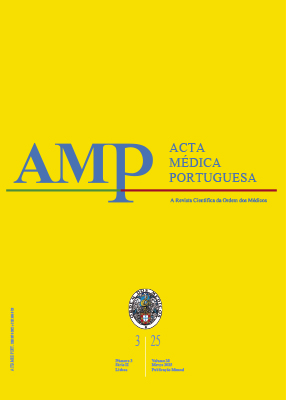Recurrent Syncope During Migraine Attacks
DOI:
https://doi.org/10.20344/amp.22134Keywords:
Atrioventricular Block, Migraine Disorders/complications, SyncopeAbstract
Migraine is a cyclic condition with attacks consisting mainly of intense headaches, sensory intolerance, and nausea or vomiting. Loss of consciousness during attacks is often attributed exclusively to a neurally mediated reflex to pain, although it may also be due to migraine’s autonomic impairment, with cardiac conduction abnormalities, probably in relation to a degree of reduced sympathetic function. We report the case of a 51-year-old woman presenting episodes of syncope exclusively after vomiting during migraine attacks. A 24-hour Holter monitoring performed during a migraine attack disclosed an intermittent complete atrioventricular block coincident with an episode of syncope. The patient was implanted with a pacemaker without further syncopes on subsequent attacks. This case highlights the importance of clinical suspicion and investigation of syncope during migraine attacks. Recurrent syncope during migraine should not be attributed to pain to avoid misdiagnosis and ensure the treatment of other important causes of syncope.
Downloads
References
Thijs RD, Kruit MC, van Buchem MA, Ferrari MD, Launer LJ, van Dijk JG. Syncope in migraine: the population-based CAMERA study. Neurology. 2006;66:1034-7. DOI: https://doi.org/10.1212/01.wnl.0000204186.43597.66
Nye BL, Thadani VM. Migraine and epilepsy: review of the literature. Headache. 2015;55:359-80. DOI: https://doi.org/10.1111/head.12536
Duru M, Melek I, Seyfeli E, Kuvandik G, Kaya H, Yalçin Y. QTc dispersion and P-wave dispersion during migraine attacks. Cephalalgia. 2006;26:672-7. DOI: https://doi.org/10.1111/j.1468-2982.2006.01081.x
Van Dijk JG, Thijs RD, Benditt DG, Wieling W. A guide to disorders causing transient loss of consciousness: focus on syncope. Nat Rev Neurol. 2009;5:438-48. DOI: https://doi.org/10.1038/nrneurol.2009.99
Shailesh F, Sewani A, Paydak H. Recurrent AV block following ablation for AVNRT. Indian Heart J. 2014;66:710-3. DOI: https://doi.org/10.1016/j.ihj.2014.10.410
Aste M, Brignole M. Syncope and paroxysmal atrioventricular block. J Arrhythm. 2017;33:562-7. DOI: https://doi.org/10.1016/j.joa.2017.03.008
Miglis MG. Migraine and autonomic dysfunction: which is the horse and which is the jockey? Curr Pain Headache Rep. 2018;22:19. DOI: https://doi.org/10.1007/s11916-018-0671-y
Ghodke-Puranik Y, Thorn CF, Lamba JK, Leeder JS, Song W, Birnbaum AK, et al. Valproic acid pathway: pharmacokinetics and pharmacodynamics. Pharmacogenet Genomics. 2013;23:236-41. DOI: https://doi.org/10.1097/FPC.0b013e32835ea0b2
Ahn AH, Basbaum AI. Where do triptans act in the treatment of migraine? Pain. 2005;115:1-4. DOI: https://doi.org/10.1016/j.pain.2005.03.008
Stancu C, Sima A. Statins: mechanism of action and effects. J Cell Mol Med. 2001;5:378-87. DOI: https://doi.org/10.1111/j.1582-4934.2001.tb00172.x
Almeida S. Cardioneuroablation: a game-changer for vasovagal syncope. Rev Port Cardiol. 2023;42:831-3. DOI: https://doi.org/10.1016/j.repc.2023.05.008
Sutton R, Brignole M, Benditt DG. Key challenges in the current management of syncope. Nat Rev Cardiol. 2012;9:590-8. DOI: https://doi.org/10.1038/nrcardio.2012.102
Downloads
Published
How to Cite
Issue
Section
License
Copyright (c) 2024 Acta Médica Portuguesa

This work is licensed under a Creative Commons Attribution-NonCommercial 4.0 International License.
All the articles published in the AMP are open access and comply with the requirements of funding agencies or academic institutions. The AMP is governed by the terms of the Creative Commons ‘Attribution – Non-Commercial Use - (CC-BY-NC)’ license, regarding the use by third parties.
It is the author’s responsibility to obtain approval for the reproduction of figures, tables, etc. from other publications.
Upon acceptance of an article for publication, the authors will be asked to complete the ICMJE “Copyright Liability and Copyright Sharing Statement “(http://www.actamedicaportuguesa.com/info/AMP-NormasPublicacao.pdf) and the “Declaration of Potential Conflicts of Interest” (http:// www.icmje.org/conflicts-of-interest). An e-mail will be sent to the corresponding author to acknowledge receipt of the manuscript.
After publication, the authors are authorised to make their articles available in repositories of their institutions of origin, as long as they always mention where they were published and according to the Creative Commons license.









